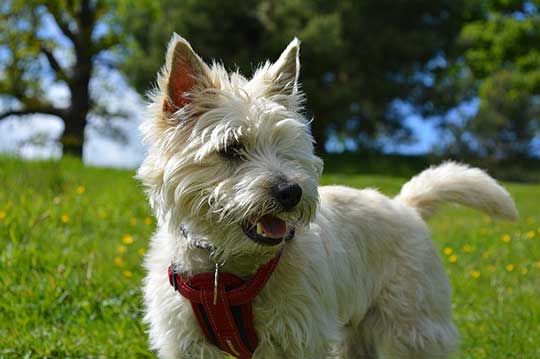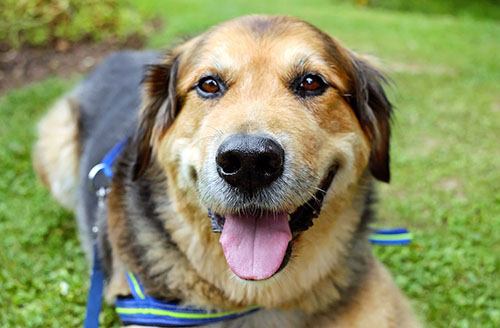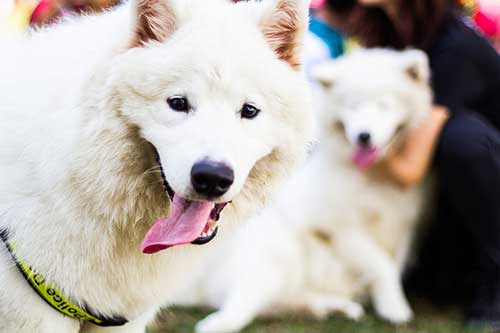Have you ever bent down to receive a sloppy kiss from your dog to find yourself saying “my dogs breath smells like fish”.
It is not an uncommon occurrence, but it can cause great concern for pet owners. Not only is this fishy smell incredibly unpleasant for anyone that has to come within close range of your dog’s mouth. It can be quite mysterious for anyone that can’t place the source of the stench.
You may think that it is just a sign that a little of the fish he ate for dinner is still lingering, but the pungent nature of the smell is enough to tell you that this isn’t the case.
So what is it that means that your dog has fish breath.
Once we have ruled out some of the more pressing concerns about your pups health, we will come to the real reason for this fishy breath.
We will look at the cause and the solutions to the problem so that you can provide the right course of action. [/thrive_text_block]
Table of Contents
Isn’t bad breath in dogs normal? Why are we so concerned about a little bit of odour?
There is a common misconception with dog owners that a bit of bad breath in dogs is the norm. They are animals after all.
[thrive_text_block color=”red” headline=””] However, a dog that has good dental hygiene shouldn’t have bad breath at all.The breath of a dog shouldn’t have any scent other than the food they just eat or the doggy toothpaste you just used.
Bad breath can be the result of tooth and gum problems. [/thrive_text_block]
Unfortunately, dogs are susceptible to gum disease, tartar and plaque. This particularly true in small breeds with flat faces and short-nosed and teeth close together.

My dog’s breath smells really bad. Does that mean I need to worry about his health?
All cases of bad breath should be dealt with in order to keep your canine pal as fit and healthy as possible.
[thrive_text_block color=”blue” headline=””]The base case scenario is that the odour coming from their mouths is merely a result of a lapse in hygiene.Perhaps you haven’t brushed their teeth as recently as you should have.
Perhaps there is a bit of food trapped or some bacteria build up is leading to a case of halitosis. [/thrive_text_block]
If this is the case you can make sure to get back into a good regime, give them a dental chew or try a helpful home remedy for dog breath.
This includes a good dog-friendly mouthwash of a dental drinking additive in their water, doggy breath mints – not the human kind – and other types of food additives that can be added to a meal.
There are certain brands that make powders to sprinkle on food to eliminate bad doggy breath.
Some dog owners swear by Tropiclean fresh breath plaque remover pet water additive.
[easyazon_infoblock align=”none” identifier=”B0054WTPBY” locale=”US” tag=”howtotrainy03-20″]There is also the Tropiclean fresh breath plaque remover Pet clean teeth gel for those that want to stick with basic dental practices, rather than food additives.
This gel is a great alternative to toothpaste because it is more natural and less time consuming. There is no need to brush.
Instead the dog moves the gel around the mouth after a simple application to the teeth. He is just trying to lick the minty flavour. In doing so, he transports odour-fighting particles around the mouth.
[easyazon_infoblock align=”none” identifier=”B00379KT66″ locale=”US” tag=”howtotrainy03-20″]What about the worst case scenarios? What should dog owners be looking out for?
[thrive_text_block color=”note” headline=””]There are two scents other than fishy dog breath that vets would recommend pet owners to look out for. Some dog owners mistakenly make the link dog fishy breath and kidney disease. [/thrive_text_block]In reality, kidney disease is detected by smelling ammonia in the breath of dogs.
[thrive_text_block color=”blue” headline=””]The malfunction of the kidneys lead to a buildup of urea in the body’s system and then comes through in the dog’s breath.Some dog owners may overlook any scent of urine or faeces in their pet’s breath because of their tendency to still their nose in pretty much anything. [/thrive_text_block]
However, a strong, persistent scent is a problem. Make sure to take a dog to the vet if they exhibit these signs.
The same goes for any owner that thinks that their dog’s breath smells like pear drops or nail varnish remover.
[thrive_text_block color=”blue” headline=””]This is an indicator of a build up of acetone ketones in the body – acetone being a primary part of nail varnish remover.In this case, it is created as the body fails to deal with blood glucose levels and insulin. Acetone doggy breath could be a sign of diabetes. [/thrive_text_block]

So if dog fish breath isn’t down to kidney disease or halitosis, then what is the problem?
[thrive_text_block color=”note” headline=””]The most common answer to the problem is quite an unpleasant one.The source of that fishy smell is the secretion from the anal glands of the dog. The dog has been licking them and the smell of the fluid is lingering in their mouth.
This probably isn’t what you want to hear. My dog breath smells like fish because of an anal issue is a pretty disgusting sentence. [/thrive_text_block]
However, you need to know precisely what is wrong in order to handle the issue.
Problem solved? Sadly not.
[thrive_text_block color=”red” headline=””]Dog’s may sniff each other’s rear ends for fun but they rarely lick their own for pleasure. The act of a dog licking its own anal glands is a sign of discomfort and malfunction.The anal glands are not working properly and the dog is trying to correct the problem and relieve the issue.
It is a similar case when dogs scoot around on their bottoms on the floor. This can sometimes be a way of expressing these glands of fluid when it is not happening naturally. [/thrive_text_block]
What is it so important that these anal glands naturally release this fluid and what are dogs trying to achieve?
The anal glands of a dog release fluid naturally during deification.
There are times when the glands don’t function in this way and the fluid can build up inside. This means that the glands become impacted and uncomfortable. The dog is merely trying to encourage the fluid out to release the pressure and get back to normal.
In the worst cases, this impaction can become severe and the glands can swell, because painful and even become infected.
The last thing that you want is your dog developing an abscess and being in pain because you ignored the fact that your dog had fishy breath.

How to get rid of fishy dog breath: what are the best methods of helping your dog with this issue and combating fish breath in dogs for good?
The best course of action for your dog depends on the severity of the problem.
If the issue is not that bad and there is just a minor issue with the release of the glands, you may be able to solve the problem at home by yourself.
If the glands are swollen, appear to be infected or your dog wont let you touch his bottom, it is time to go to the vet.
Dealing with anal glands at home when dog breath smells like fish.
The first thing to consider is draining the glands by hand to release the pressure and offer some relief to the dog.
If you can do this for them, they will see no need to lick themselves and you may cure the dog fishy breath.
[thrive_text_block color=”blue” headline=””]You will need to gently insert your index finger into your dog’s anus, only around an inch or so.
You then need to feel around for the gland so that you can drain it. It should not be too hard to find if it is impacted because it will be swollen with fluid. The size of the gland will depend on the breed of dog.
With your index finger on the inside and your thumb on the outside, gently stimulate the glands to release the liquid onto a paper towel.
Continue until the sac is empty and repeat with the second gland. Clean the area afterwards.
[/thrive_text_block]This is something that you don’t want to do too often for fear of making the problem worse. It is also not a pleasant experience for many reasons. It is great if you can manage on your own because this means the master is helping the dog and saving them from discomfort – and a scary vet visit.
However, over-expression can damage the gland and cause irritation and discomfort. Know when to rise to the occasion and when to let nature do its thing.
[thrive_text_block color=”note” headline=””]Of course curing the bad breath doesn’t cure the issue. A one off drainage session may not be enough if there is an underlying problem.You may find that the gland clog up again and your dogs breath smells like fish again in a short period of time. The issue could be dietary. The anal glands are usually stimulated by pressure as they pass their stools. Perhaps this is not happening because the stools are too small and soft. [/thrive_text_block]
Many pet owners in this situation recommend changing a dog’s diet in order to improve the natural process and cure the issue completely.
The idea of dog food for bad breath may seem like a quick fix in other situations, but here you are doing more than simply masking the smell.
A good, fibrous diet could help to restore order at the rear end and eliminate the desire to lick the glands.
Taking your dog to the vet if the dog smells like fish.
More serious issues of infection and compaction will require a professional hand and perhaps a cause of medication. This is when you need to consult with a vet. You should mess with an infected area when a vet can handle it much more easily.
[thrive_text_block color=”blue” headline=””] If your dog has developed an anal gland abscess, it must be handled by a veterinarian. They will lance the abscess and administer a prescription of antibiotics for about 7 to 14 days.[/thrive_text_block]There is also the chance that the problem is more long-term, even with careful draining and a better diet.
If this happens then talk to a vet about a more permanent solution. The best approach might be an anal sacculectomy. This is where the dog’s anal glands are removed completely. This may seem drastic, but it prevents further discomfort and the risk of abscesses and infections in later life.
So what have we learned about the issue of fishy smells in dog breath?
There are three very important things to take away from this guide.
[thrive_text_block color=”blue” headline=””]The first is the fact that bad breath in dogs is not something that we should expect, or expect our pets to live with. A dog with a good diet and good dental hygiene should have odourless breath.
The second is that there are some scents that are a sign of poor health and require immediate attention. Anyone smelling ammonia should consult a vet about kidney issues. Any scent of acetone means that a diabetes test may be in order. The scent of fish means that a dog may have some issues with their anal glands that need immediate attention.
The third thing to remember is that as unpleasant as it is to know that your cute puppy’s breath smells like fish because they are licking impacted anal fluid, it cannot be ignored. The sooner you examine the area and determine the severity of the problem, the easier it is to deal with.[/thrive_text_block]
The next time that you have a kiss from your pup and you think “my dogs breath smells like fish”, don’t laugh it off and blame the fishy dog food. As soon as you smell it, take the time to examine your dog’s bottom – if they let you.
The sooner you can relieve them of the discomfort of anal impaction and improve the function of the gland, the more pleasant it will be for all concerned. It is not a pleasant procedure but all you need to do is think about the good you are doing and how grateful they will be.
Featured Picture: Pixabay


